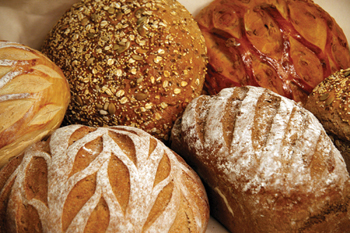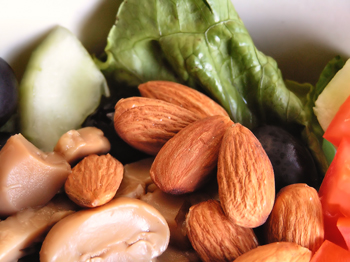A study published in the Journal of the American College of Cardiology suggests that diets high in refined starches, sugars, saturated fats, and trans fats and low in fruits, vegetables, whole grains, and omega-3 fatty acids cause inflammation. On the other hand, diets full of whole foods, including whole grains, fruits, and veggies as well as unsaturated fats and lean protein sources, paired with habits including regular exercise and avoidance of tobacco, appeared to reduce inflammation.
Other research has shown that high blood sugar, saturated fat, trans fats, caffeine, and alcohol paired with a lack of micronutrients, antioxidants, fiber, obesity, and a sedentary lifestyle are all linked to inflammation.
What does it matter if you have inflammation? Well, it’s not an entirely bad thing as it is part of your natural immune response. Inflammation occurs in times of need to help restore and repair damaged tissue to normal (think of how your finger swells up if you cut it). This is because it is rushing lots of blood and cells to the area to heal it. Normally, the body will get a signal telling it to turn off the inflammation when the issue has resolved.
The problem with inflammation arises when it becomes chronic. When inflammation becomes consistent it can actually damage cells and lead to the progression of many diseases including heart disease, cancer, multiple sclerosis, Alzheimer’s, and rheumatoid arthritis.
There are strong indications that a healthful diet and lifestyle may decrease the risk of inflammation. So follow the 10 tips below!
1. Improve your blood sugar levels through smart eating.
Short term hyperglycemia (or high blood sugar), related to refined grains and sweets may increase circulating levels of cell damaging free radicals and pro-inflammatory components in the body. The fiber content of whole grains, fruits, and veggies causes food to travel through the gastro-intestinal tract at a slower rate and thus better control blood sugar levels.

2. Rid your diet of trans fats and saturated fats.
Shelf stable food items and fast food are a major source for trans fats while saturated fats can be found from animal sources such as cream, butter, fatty meat, and the skin of chicken and animals. Cooking at home will also help you avoid not only unwanted trans fats, but also unwanted oils, salt, or other preservatives in your food.
3. Focus primarily on whole plant foods to increase fiber, micronutrient, antioxidant, and phytonutrient intake.
A plant based diet full of vegetables, fruits, whole grains, nuts, seeds, and beans is linked to better control of pro-inflammatory components in the body.

4. Eat moderately low amounts of animal proteins and instead focus on plant proteins from legumes, nuts, seeds, and soy.
This will not only help you avoid saturated fat, but also excessive cholesterol which may elicit an inflammatory effect.
5. Consume the recommended intake of omega-3 fatty acids.
Eat at least two servings of fish per week. Supplement with omega 3 from other dietary sources including the following types of oils: canola, walnut, flaxseed or from foods including whole walnuts or ground flaxseeds. It is important to have a greater intake of omega 3s than omega 6s (shoot for no more than 3-5% of your total calories from omega 6’s.) Omega 3s have an anti-inflammatory effect which is one of the reasons they are linked to a reduced risk of heart disease.

6. Fill your diet with fruits and vegetables.
And especially focus on red and purple fruits! The red pigment in these foods is representative of the antioxidant called anthocyanin which has an anti-inflammatory effect. Other fruits and vegetables provide fiber and a wide array of nutrients and other antioxidants which do nothing but protect you.
7. Achieve the recommended amount of Vitamin D per day (600 IU/day.)
Vitamin D is a regulatory step in the immune system and mediates inflammation. When vitamin D consumption is low, pro-inflammatory components called cytokines are not controlled.
8. Limit your alcohol intake.
Limit to only 1 alcoholic beverage per day for women and 1-2 per day for men. (A drink is one 12 oz beer, 1 shot of spirits, 8 oz of malt liquor, or one 5 oz glass of wine.)
9. Make exercise a regular habit.
Shoot for at least 30 minutes a day of moderate activity most days of the week for most healthy adults. (Take your dog for a brisk walk!) The 30 minutes can even be broken down into 10 minute increments and still remain effective. Increase the amount of exercise to increase the benefits.
10. Maintain a healthy body weight.
Talk to a dietitian or doctor to find your ideal body weight and be sure to take in consideration muscle mass versus body fat.
Works Cited:
Calder PC, Albers R, Antoine JM, Blum S, Bourdet-Sicard R, Ferns GA, Fokerts G, Friedmann PS, Frost GS, Guarner F, Lovik M, Macrarlane S, Meyer PD, M’Rabet L, Serafini M, Van Eden W, Van Loo J, Vas Dias W, Vidry S, Winklhofer-Roob BM, Shao J. Inflammatory Disease Processes and Interactions with Nutrition. Br J Nutr. 2009. 101;1:S1-45.
Giugliano D, Ceriello A, Esposito K. The Effects of Diet on Inflammation Emphasis on the Metabolic Syndrom. J. Am. College of Cardiology. 2006. 48:4: 677-685.
Meerschaert C. Alleviate Achy Joints- Healthful Fats and Whole Foods May Relieve Symptoms. Today’s Dietitian. 2012. 14;4:12.



